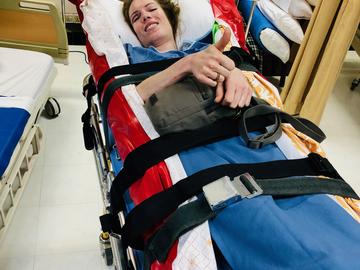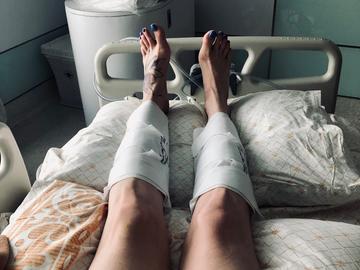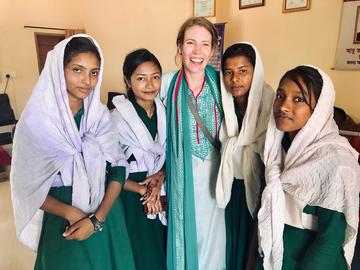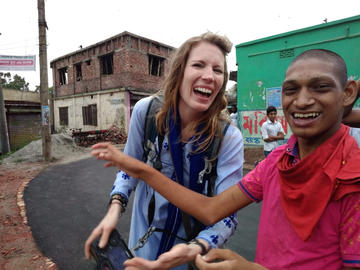
Switching Lenses
Magazine | Fall/Winter 2019 | Mind and Body
by Barbara Balfour, BA’03, BComm’04
banner photo by Devon MacKay Photography
all other photos by Leya Russell, her nurses and handlers
The relationship between artist and subject is always complex — but what happens when the photographer becomes the subject due to an unforeseen disaster?
UCalgary alumna Leya Russell, BA’08, BFA’11, made international headlines earlier this year when she survived a harrowing plane crash in southeast Asia. The crash left her having to learn how to walk again — but it wasn’t her first brush with death.
The first was when she was only 21, backpacking solo across the northern tip of India on a journey of self-discovery.
Waiting on the platform for the overnight train to Calcutta, she saw an emaciated man lying on the ground. Thinking he was probably starving, she bent down to offer him some cookies from her backpack, but realized he was dead.
“His eyes were wide open and flies were crawling on them. I was hysterical, but the other people on the platform were unconcerned — they were just ushering me away,” recalls the Calgary-based photographer.
“I was a wreck. It was one thing to see death. It was quite another to see someone’s life end and have that not seem to matter. That bothered me much, much more.”
The now-35-year-old UCalgary grad whose degrees are in religious studies and fine arts, has since become an award-winning visual artist who has travelled the world, having had her photos published in National Geographic.
It was while taking a break after a three-week assignment in Bangladesh for Photographers Without Borders this past May that Russell had her second brush with death, surviving a plane crash that left her with a broken back and a concussion so severe, she had to learn how to walk, dress and feed herself all over again.
In Bangladesh, Russell had been documenting the stories of individuals who had received support from the Centre for Disability in Development. What was supposed to be a three-day vacation in Myanmar afterwards, before heading home to Calgary, turned into one of the most terrifying experiences of her life.
Her flight from Dhaka to Yangon on Biman Bangladesh Airlines was supposed to be only one hour long, but it turned into three as the plane repeatedly tried to land before finally missing the runway and crashing in a nearby field.
Russell was knocked unconscious, only coming to because of the cries of her 35 fellow passengers who were covered in blood, including a flight attendant whose spinal cord had been severed.
With two fractured vertebrae and a serious concussion, she had to walk one kilometre across a field in lashing rain to get to a bus that brought the injured passengers to the arrivals gate. There they lay on the airport floor, waiting for help for 40 minutes.
A behind-the-scenes look at the plane crash that almost claimed Leya Russell’s life.
“They put me on a stretcher in a caravan with no seatbelts. It hurt so much to be sliding around on this stretcher, whipped around in a vehicle going as fast as it can. I yelled at the paramedic to hold my hips, but she didn’t speak English,” Russell recalls.
She was sent to three different hospitals, where the staff weren’t equipped to deal with her injuries and the language barrier only made things worse.
After two weeks in a Bangkok hospital, five days of which were spent in the ICU, Russell struggled with the after-effects of her injuries back home in Calgary, relying on her 16-year-old daughter, in a complete role-reversal, to shower, dress and feed her.
While she did not need surgery — despite losing a full inch in height and developing scoliosis — Russell was fit with a restrictive upper-body brace she had to wear for four months, which she could not put on by herself.
There were also pragmatic concerns weighing on her mind: her injuries prevented her from being able to photograph the summer weddings that supply the bulk of her income as a single mother.
And yet, Russell says, she cannot wait to get back behind a lens in far-away places. This November, she plans to head to Varanasi, India, with the ultimate goal of going back to Bangladesh and photographing the Rohingya people, whose flight from violence in Myanmar has been described as the world’s fastest-growing refugee crisis.
“I don’t have a normal sense of fear. I’m so curious; I get restless,” says Russell with a laugh, sitting in her artist’s studio in the backyard of her Sunnyside home.
“Once I’m able to work again, I will be on the road. We’re all going to die, but I won’t let that stop me from living my life. I don’t want my daughter to see me not follow my dreams because of fear.”
Russell has been dreaming — and beating the odds — for a long time. She grew up poring over the pages of National Geographic while whiling away the time in remedial classes alongside children with autism and Down syndrome; her own dyslexia and ADHD were not accurately diagnosed until she was 30.
“I always felt like an outcast, being segregated from the other kids, and it made me want to find a sense of belonging,” she says.
We’re all going to die, but I won’t let that stop me from living my life. I don’t want my daughter to see me not follow my dreams because of fear.
— Leya Russell
BA’08, BFA’11
Working overseas, Leya Russell has had assignments from National Geographic and other organizations.
As a teen, Russell was so rebellious she dropped out of high school, ultimately becoming a single mother at 18. For a while, she was homeless, living at a youth shelter while working full-time throughout her pregnancy as a prep cook at the Good Earth Café, stopping only two days before her daughter was born.
The following September, Russell went back to school, upgrading her high school credits and eventually earning a Bachelor of Arts in 2008, majoring in Eastern religions, and a Bachelor of Fine Arts in 2011, during which she began nurturing her future career in photography.
“The U of C really pushed me to be curious. I felt so supported by all the faculty during my BFA degree, and even my Hinduism professor encouraged me to go to India when I was doing my BA,” she says.
“People were seeing me for the first time and pushing me to grow. I learned to take criticism and keep on trying. Not every institution will support fearless curiosity or encourage you to connect to something bigger than yourself.”
Those lessons on resilience have helped Russell enormously since the accident. Not only physically, but also spiritually.
“You only get one life,” Russell says. “All of us are dying, and all of us have a short time here on earth. We all have to help each other. It’s just an accident of birth that I was not born a Rohingya or anywhere else in the world. I’m so lucky to have had all these privileges and advantages in my life.”
Magazine | Fall/Winter 2019 | Mind and Body
Explore more

Who Will Help Mom?
Over the next 20 years, Canada’s seniors’ population is expected to grow by 68 per cent and we, as a nation, are not ready. In fact, experts say we are facing a multifaceted economic, social and health-care crisis as our elder population grows. What are our priorities and what is UCalgary doing about the splintered system that exists today?

2019 Arch Award Recipients
Meet six remarkable alumni who are blazing trails across our skies, creating spaces for us to marvel at, championing rights for Indigenous people, leading coalitions of people, innovating new tech platforms and building bridges across global organizations. Although this year’s recipients walked the red carpet at the recent Arch Awards, their stories bear a replay.

Notebook
How did alumna Susanne Craig, BA’91, Hon. LLD’19 go from being a campus newspaper reporter to winning the Pulitzer; why language is critical, especially in the LGBTQ2S+ community; alumni star in a new movie; what, exactly, is Rococo Punk?

Can't Get Enough?
Take the ultimate tour of campus with President Ed McCauley, meet the 2019 Arch Award recipients and find out what UCalgary is doing about the coming health-care crisis as our elder population grows. All this and more in the Fall/Winter 2019 Alumni Magazine.




















